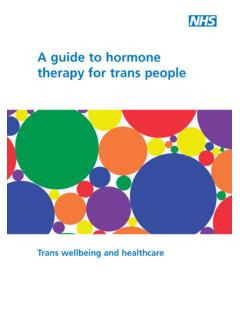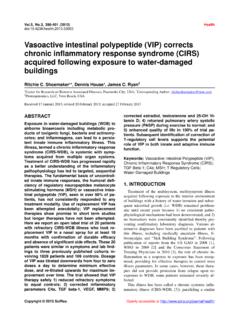Transcription of Re-Thinking Genital Surgeries on Intersex Infants
1 Re-Thinking Genital Surgeries on Intersex Infants June, 2017 M. Joycelyn Elders, , 15th Surgeon General of the United States David Satcher, , , FAAFP, FACPM, FACP 16th Surgeon General of the United States Richard Carmona, , , FACS 17th Surgeon General of the United States On October 26, 2016, the 20th anniversary of Intersex Awareness Day, the State Department issued a statement recognizing that Intersex persons routinely face forced medical Surgeries that are conducted at a young age without free or informed consent. These interventions jeopardize their physical integrity and ability to live free.
2 1 The government is one of many that have recently raised questions about infant genitoplasty, cosmetic Genital surgery meant to make an infant s genitals match the binary sex category they are assigned by adults entrusted with their care. Genitoplasty is often performed on Infants with Intersex traits, a condition known as DSD, or Disorders/Differences of Sex Development. Although well-intentioned many parents and physicians believe it is more trying for individuals to live with atypical genitalia than to have it corrected early on there is growing recognition that this belief is based on untested assumptions rather than medical research, and that cosmetic Genital surgery performed on Infants usually causes more harm than good.
3 Fortunately, a consensus is emerging that concludes that children born with atypical genitalia should not have genitoplasty performed on them absent a need to ensure physical functioning. Government agencies in Germany, Switzerland, Australia, Chile, Argentina, and Malta, as well as human rights groups, including the World Health Organization, have examined this issue and found that these irreversible medical procedures, which are performed before individuals can articulate whether they wish to undergo such surgery, are not necessary to ensure healthy physical functioning, and that such surgery is not justified when performed on Infants .
4 These bodies have called for a moratorium on cosmetic infant genitoplasty so as to allow individuals with a DSD to have substantive input into decisions affecting their own identity and appearance. Performing cosmetic infant genitoplasty was not always the default practice. Before the middle of the twentieth century, most children born with genitalia that did not fit the male-female binary norm were not subjected to surgery. Beginning in the 1950s, however, an era when pressure to conform to social norms was often unyielding, the standard treatment protocol shifted. Infants born with atypical genitalia were subjected to surgical procedures such as clitoral reduction, vaginoplasty, gonadectomy, and hypospadias repair, primarily to normalize gendered appearance, not to improve function.
5 Since this period, as a 2016 consensus statement notes, good-faith disagreement has existed among physicians about whether and when cosmetic infant genitoplasty should be Some physicians recommend surgery because they believe it will decrease the likelihood that children will suffer emotional trauma from having atypical gender characteristics. While we do not doubt that doctors who support and perform these Surgeries have the best interests of patients and their parents at heart, our review of the available evidence has persuaded us that cosmetic infant genitoplasty is not justified absent a need to ensure physical functioning, and we hope that professionals and parents who face this difficult decision will heed the growing consensus that the practice should stop.
6 Our view is based on three simple and compelling rationales. First, there is insufficient evidence that growing up with atypical genitalia leads to psychosocial distress. After reviewing several dozen studies that purported to examine the impact of having a DSD, we have concluded there is a dearth of persuasive evidence showing that children or adults are psychologically harmed from having atypical genitalia, or that they are better off if they undergo cosmetic genitoplasty as Infants . For the most part, studies that did draw a connection between atypical genitalia and emotional distress simply assumed, rather than showed, a causal link between the Second, while there is little evidence that cosmetic infant genitoplasty is necessary to reduce psychological damage, evidence does show that the surgery itself can cause severe and irreversible physical harm and emotional distress.
7 Although doctors strive to predict the likely gender identity of these Infants , a significant percentage will develop a gender identity different from the one assigned at birth. Irreversible Genital surgery, including removal of healthy Genital tissue, can be traumatic if the gender assignment turns out to conflict with the individual s own gender Even if the gender prediction is correct, a number of complications associated with these Surgeries can arise, including loss of sexual sensation, pain during intercourse, incontinence, scarring, and the need for repeat Surgeries . A gonadectomy can create a need for hormone replacement therapy, and may also preclude potential fertility available through developments in assisted reproductive In short, Surgeries whose purpose is to ensure physical and psychological health too often lead to the opposite result.
8 Finally, these Surgeries violate an individual s right to personal autonomy over their own future. While Surgeries such as the creation of an absent urethral opening can be justified because they ensure physical functioning, neither clitoral reduction surgery nor the creation of a vagina is ever necessary in Infants to ensure physical functioning, and hypospadias repair is rarely necessary. Clitoral reductions and the removal of healthy gonads clearly infringe on the child s right to physical integrity, preservation of sexual and gender identity, and procreative freedom. In some cases, a gonadectomy may be appropriate to address a risk of cancer, but this surgery can generally wait until puberty, when the affected individuals can have a voice in the decision about whether to undergo such a Medical experts agree that more research is needed to determine the optimal treatment for children born with a DSD.
9 In the meantime, babies are being born who rely on adults to make decisions in their best interest, and this should mean one thing: When an individual is born with atypical genitalia that pose no physical risk, treatment should focus not on surgical intervention but on psychosocial and educational support for the family and child. Cosmetic genitoplasty should be deferred until children are old enough to voice their own view about whether to undergo the surgery. Those whose oath or conscience says do no harm should heed the simple fact that, to date, research does not support the practice of cosmetic infant genitoplasty.
10 1 Department of State, In Recognition of Intersex Awareness Day (statement by John Kirby, Assistant Secretary and Department Spokesperson, 2016). 2 Lee PA, Nordenstr m A, Houk CP et al. Global disorders of sex development update since 2006: perceptions, approach and care (consensus statement). Horm Res Paediatr. 2016;85:158 180. 3 Ibid., 167, 176. 4 Cohen-Kettenis PT. Gender change in 46,XY persons with 5alpha-reductase-2 deficiency and 17beta-hydroxysteroid dehydrogenase-3 deficiency. Arch Sexual Behav. 2005;34(4):399-410. 5 Hughes IA, Houk C, Ahmed SF, Lee PA. Consensus statement on management of Intersex disorders.



